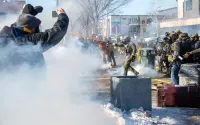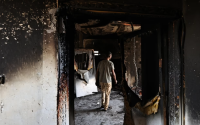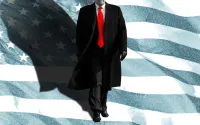14 February 2007Yahoo News!
Global legislators met in snowbound Washington to debate a new pact against catastrophic climate change and find ways of luring laggards like the United States and China on board.
German Chancellor Angela Merkel, addressing the forum at the US Senate in a recorded video message, said she was determined to bring about breakthroughs on global warming during her tenure this year as Group of Eight chair.
The Washington gathering, she said, presented a "unique forum" to address the problem through talks among lawmakers from the G8 powers plus five major developing economies -- Brazil, China, India, Mexico and South Africa.
The legislators aim to craft a consensus position on climate change to present to the German leader Thursday.
Merkel said the scientific evidence now leaves "no room for doubt" that climate change is real, is man-made, and risks becoming an irreversible disaster without action now.
Many of the forum delegates noted the alarming conclusions of the Intergovernmental Panel on Climate Change delivered at a Paris conference this month.
The UN body said fossil fuel pollution would raise temperatures this century, worsen floods, droughts and hurricanes, melt polar ice and damage the climate system for a thousand years to come.
Following an inaugural meeting in Brussels in mid-2006, the Washington forum is the second informal attempt by legislators to try to craft the outlines of a global-warming pact to succeed the Kyoto treaty, which expires in 2012.
The Republican administration of US President George W. Bush refused to adopt Kyoto, arguing the economic costs would be crippling and the science remained unclear.
The treaty also left out emerging nations like India and China, which is building a new coal-fired power plant at the rate of one a week to sustain its stunning economic transformation.
But a bevy of influential US senators including Republican presidential hopeful John McCain (news, bio, voting record) lined up to insist that change is coming in the world's largest economy and its heaviest polluter.
"The debate is over, my friends. The question is, what do we do," said McCain, who with former Democratic vice presidential candidate Joe Lieberman has introduced a bill to enforce a "cap and trade" system for US industry.
Under this system pioneered by the European Union, companies trade excess emissions of greenhouse gases like carbon dioxide among themselves with the aim of slashing overall levels.
Such schemes are already being used experimentally by California and northeast US states, while pressure for change is coming also from evangelical leaders who argue that God entrusted the Earth to man's stewardship.
Republican Senator Olympia Snowe (news, bio, voting record) noted the irony that the legislators' forum had coincided with Washington's biggest snowstorm of this winter.
But she stressed: "I want to assure you that the bipartisan mood in Congress is moving in the right direction."
Ye Rutang, former Chinese minister for urban and rural construction, said that Beijing has given "serious priority" to the issue "in line with its sustainable development strategy."
The world's most populous nation is developing new energy technologies, and is rapidly planting new forests, he stressed.
With the US Congress now under Democratic control, ideas like cap and trade carbon markets are getting a new hearing in Washington.
And even Bush has been sounding less skeptical about the issue, mentioning global warming as a man-made problem in his State of the Union speech to Congress last month.
Among the hard-nosed US business community, many are looking to the potential investment boom that could come from building up efficient and renewable energy sources to tackle climate change.
"We believe that the time has come for America to adopt a market-based approach. We believe that cap and trade is just that," said Rick Lazio, a former Congressman who is now a top Wall Street executive at JPMorgan Chase.






